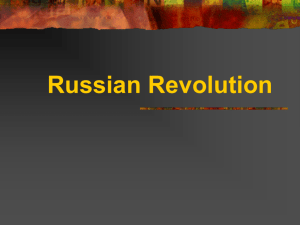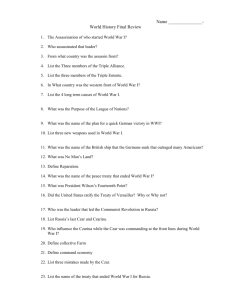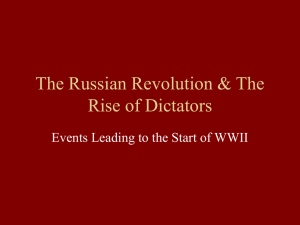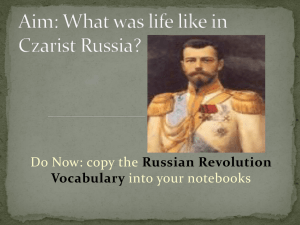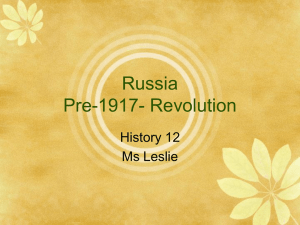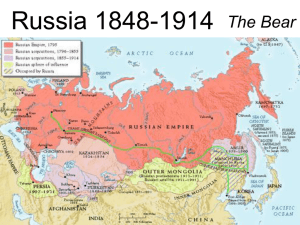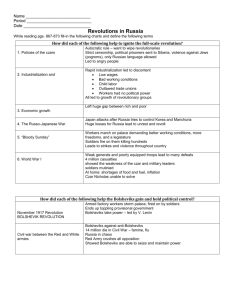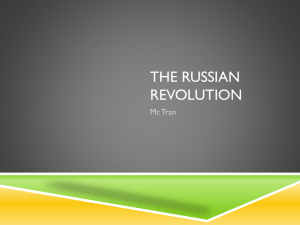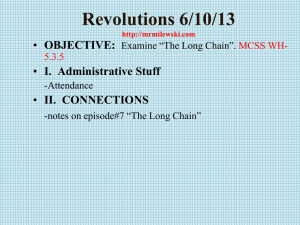Causes of the Russian Revolution
advertisement
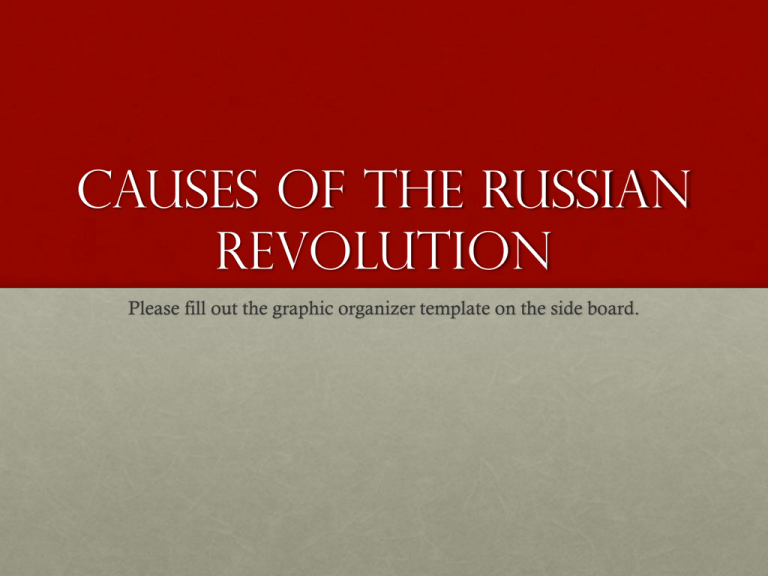
Causes of the Russian Revolution Please fill out the graphic organizer template on the side board. CZARS UNREST EVENTS Causes of the Russian Revolution RUSSIAN REVOLUTION COMMUNISIM Setting the stage • The Russian Revolution was like a firecracker with a very long fuse. The explosion came in 1917, yet the fuse had been burning for nearly a century. The cruel, oppressive rule of most 18th century czars caused widespread social unrest for decades. Army officers revolted in 1825. Secret revolutionary groups plotted to overthrow the government. In 1881, revolutionaries angry over the slow pace of political change assassinated the reform-minded czar, Alexander II. Russia was heading toward a full-scale revolution. A history of bad leadership • After the assassination of his father, Alexander III came to power in 1881 and kept an autocracy – a form of government in which he had absolute control • Censorship • Secret police monitored high schools and universities; teachers had to send detailed reports on students • Oppressed all non-Russians • Forbade an language other than Russian • Forbade any religion other than Russian Orthodoxy • All violators were labeled dangerous or sent to Siberia Czar Alexander III Czar Nicholas II • Alexander III’s son, came to power in 1894 • Continued the tradition of autocratic rule in Russia • Poor leader, was more or less blind sided when the revolution happened Czar Nicholas II Under the title “Czars” write this: • Czar Nicolas II – last King of Russia • Unfit and unpopular leader • Ignored needs of Russian workers and peasants Russia Industrializes • Russia quickly became an industrialized nation • The number of factories doubled between 1863 and 1900 • Russia became the world’s fourth-ranking producer of steel • But Russia still lagged behind most European nations Industrialization Fuels Revolution • With rapid industrialization came many problems • • • • • Grueling working conditions Low wages Child labor Government outlawed trade unions Workers began to organize strikes • Unhappy Russians started to organize (these people supported Marxist ideas) and two parties emerged • Bolsheviks (radical) • Mensheviks (moderate) Under the title “Social unrest” write: • Lack of work • Lack of food • Lack of advancement – fell behind the rest of the world and crippled economy Crises at home and abroad • Russo-Japanese War • War between Russia and Japan over territories in Korea and Manchuria (region in China) • Russia fully expected to win the war, but was repeatedly hammered by the Japanese • Ended with the Treaty of Portsmouth • Russia gave up Manchuria and Korea • Weakened the Russian Empire • Bloody Sunday • January 22, 1905 • 200,000 workers and their families approached the czar’s Winter Palace asking for better working conditions and the czar’s generals ordered soldiers to fire into the crowd wounding 1000s and killing 100s • WWI • Czar Nicholas II made the decision to get involved with WWI • Russia was not prepared for war in any way, shape or form and the Germans inflicted heavy casualties • Russo-Japanese War and WWI revealed the weaknesses of the czar’s rile and military leadership Under the title “key events” write this: • Russo-Japanese War – lost money, territory and power • Bloody Sunday – sparked waves of violence against the government • WWI – heavy losses



